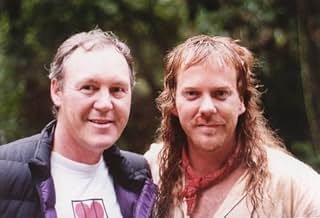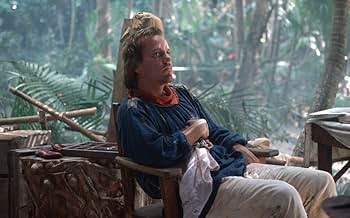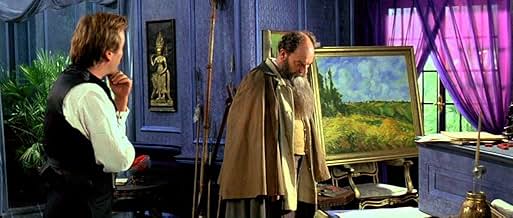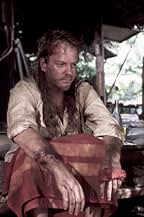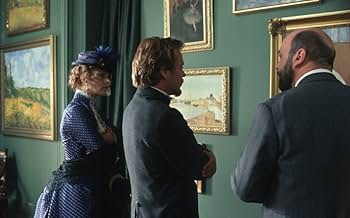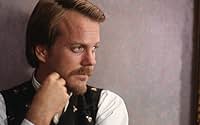AVALIAÇÃO DA IMDb
5,7/10
710
SUA AVALIAÇÃO
Adicionar um enredo no seu idiomaA successful 19th century French stockbroker (Sutherland) leaves his profession to become an artist in Paris.A successful 19th century French stockbroker (Sutherland) leaves his profession to become an artist in Paris.A successful 19th century French stockbroker (Sutherland) leaves his profession to become an artist in Paris.
- Direção
- Roteiristas
- Artistas
Jana Bittnerová
- Suzanne
- (as Jana Bittnerova)
Avaliações em destaque
My son Ruben Kraaijeveld worked on this movie for 4 weeks while we lived in Prague, acting as one of Gaugain's sons. I see all the other kids named in the crew listing: Jan, Emil and Pauline, but his name is missing. That's a real shame, since he worked hard for it and was only 9 (!) at the time. Movie itself I can't rate, we've been trying for years to get a copy but to no avail. Now I am going to look even harder, there must be a way to see my own kid play!!! He's been in a movie before, an Italian one that only showed in Italy and we also couldn't see. So I'd like to get info on both movies, Paradise Found and "The inverse canon" or "Canone Inverso", which was the Italian title of the movie. Anyone out there that can help maybe??? Thanks!
Paradise Found (2003)
Paul Gauguin is a great artist, and his work is daring and beautiful. So whenever the movie lets the work show through--and it does several times--it rises to its best. And the man playing the artist, improbable as it is, is Kiefer Sutherland, who does a decent job. It's hard to say to what extent he is true to the real man--how can anyone know?--but he combines intensity and craziness in good measure.
And, to keep on the good notes, it's actually not so bad how German-born Nastassjia Kinski handles the Danish wife of Gauguin, Mette-Sophie. Several other characters make brief appearances, the one most famous is Pissarro played by Alun Armstrong, who I didn't know, but who is strong enough at making the Impressionist slightly out of touch with the changing tides of art. In fact, what the movie does accomplish is show some sense of the art scene in Paris from Gauguin's point of view, and Gauguin's friendship with Pissarro as a catalyst to his becoming a serious artist.
The story is told in interspersed flashbacks, which are distracting and almost arbitrary. It begins with Gauguin's arrival in Tahiti, then jumps back 17 years to Paris, then to Tahiti, back and forth uncountable times. And without reason, except to chop the movie up, as if a chronological telling would be dull.
More troubling is the depiction of Tahiti (and other islands in French Polynesia). It plays loose with facts. Historically, the islands were largely ruined and in disease from the colonists, not the idyllic paradise shown here, infested with a handful of soldiers and an excessively zealous Christian missionary. The struggle of the islanders to preserve their religious icons is overemphasized, and the struggle of Gauguin to land women and young girls for sex is underemphasized. He's passionate and troubled, broke and dirty. That is, he's an artist, through and through.
So it gets a bit tiring. And in fact, between all the little eruptions of energy and conflicting emotions, very little happens, really happens. And it's filmed plainly, to the point of being dull, cutting from person to person in conversation as if by formula. The sets are well done and sometimes quite beautiful, and they should have inspired a more intense visual approach. As the paintings themselves should have, too.
Paul Gauguin is a great artist, and his work is daring and beautiful. So whenever the movie lets the work show through--and it does several times--it rises to its best. And the man playing the artist, improbable as it is, is Kiefer Sutherland, who does a decent job. It's hard to say to what extent he is true to the real man--how can anyone know?--but he combines intensity and craziness in good measure.
And, to keep on the good notes, it's actually not so bad how German-born Nastassjia Kinski handles the Danish wife of Gauguin, Mette-Sophie. Several other characters make brief appearances, the one most famous is Pissarro played by Alun Armstrong, who I didn't know, but who is strong enough at making the Impressionist slightly out of touch with the changing tides of art. In fact, what the movie does accomplish is show some sense of the art scene in Paris from Gauguin's point of view, and Gauguin's friendship with Pissarro as a catalyst to his becoming a serious artist.
The story is told in interspersed flashbacks, which are distracting and almost arbitrary. It begins with Gauguin's arrival in Tahiti, then jumps back 17 years to Paris, then to Tahiti, back and forth uncountable times. And without reason, except to chop the movie up, as if a chronological telling would be dull.
More troubling is the depiction of Tahiti (and other islands in French Polynesia). It plays loose with facts. Historically, the islands were largely ruined and in disease from the colonists, not the idyllic paradise shown here, infested with a handful of soldiers and an excessively zealous Christian missionary. The struggle of the islanders to preserve their religious icons is overemphasized, and the struggle of Gauguin to land women and young girls for sex is underemphasized. He's passionate and troubled, broke and dirty. That is, he's an artist, through and through.
So it gets a bit tiring. And in fact, between all the little eruptions of energy and conflicting emotions, very little happens, really happens. And it's filmed plainly, to the point of being dull, cutting from person to person in conversation as if by formula. The sets are well done and sometimes quite beautiful, and they should have inspired a more intense visual approach. As the paintings themselves should have, too.
Being the die hard Sutherland fan that I am, I enjoyed this flick purely for his performance. The film is rather superficial and slow-moving, but there is quite a bit of power behind Sutherland's performance, which makes it worth the while of those who just need more of Kiefer. I can't say I'd watch this film again, but I appreciate the emotional investment that the actors put into it. A six out of ten.
The Post-Impressionist painter Paul Gauguin was famously portrayed by Anthony Quinn in the Van Gogh biopic "Lust for Life" in the fifties, a performance which won Quinn a "Best Supporting Actor" Oscar, even though his character is only on stage for eight minutes. In "Paradise Found" it is Gauguin's turn to take centre stage. This is not a complete biography of the painter- Van Gogh, for example, is never mentioned- but concentrates on two periods in his life.
In 1880 Gaugin is working as a stockbroker in Paris. His job pays well and he has become a fully paid-up member of the French haute bourgeoisie. He is also an amateur painter and an enthusiastic art collector. A chance meeting with the older artist Camille Pissarro, who later becomes a close friend, persuades him that his vocation is to paint full-time and he resigns from his job, much to the dismay of his Danish-born wife Mette.
Intercut with the scenes showing the beginning of Gauguin's artistic career are others set during a later part of his life. He is now separated from Mette and his family and living in Tahiti where he has gone to seek inspiration. He befriends the local inhabitants, whose way of life he admires, and clashes with the local missionaries and the French colonial authorities who he believes are threatening to destroy traditional Tahitian culture in their zeal to bring Christianity to the island. The film's title, an obvious play on that of Milton's "Paradise Lost", therefore has an ironic meaning. Gauguin believes that he has found Paradise in Tahiti, but it is a Paradise in danger of being "lost" again, and that danger, ironically, comes from the Christian religion of which Milton was so ardent an advocate.
Gauguin is played by Kiefer Sutherland whose father, Donald, also once played the artist, in the 1986 film "The Wolf at the Door", which I must admit I have never seen. Now there is nothing really wrong with Kiefer's performance here, but it does not really catch fire. The best of the cast is probably Alun Armstrong as Pissarro. Nastassja Kinski never really looks convincing as Mette, largely because of that blonde wig. (Someone obviously told the director, incorrectly, that there are no brunettes in Denmark).
It is not impossible to make a bad film about the life of a great artist- Derek Jarman managed it with the near-incomprehensible "Caravaggio"- but because so many famous have been passionate, larger-than-life individuals, films about them give great scope for film-makers and actors to produce something memorable. I am thinking not only of Quinn and Kirk Douglas in "Lust for Life" but also of Charles Laughton in "Rembrandt", Charlton Heston as Michelangelo in "The Agony and the Ecstasy", Colin Firth as Vermeer in "The Girl with a Pearl Earring" and Timothy Spall in Mike Leigh's recent "Mr Turner". "Paradise Found" is visually attractive, both in those scenes set in France and those taking place in the South Pacific, and overall it is not a bad film. In fact, it is quite a good one. I just felt that a film dealing with someone like Gauguin could have done better than "quite good". 7/10
In 1880 Gaugin is working as a stockbroker in Paris. His job pays well and he has become a fully paid-up member of the French haute bourgeoisie. He is also an amateur painter and an enthusiastic art collector. A chance meeting with the older artist Camille Pissarro, who later becomes a close friend, persuades him that his vocation is to paint full-time and he resigns from his job, much to the dismay of his Danish-born wife Mette.
Intercut with the scenes showing the beginning of Gauguin's artistic career are others set during a later part of his life. He is now separated from Mette and his family and living in Tahiti where he has gone to seek inspiration. He befriends the local inhabitants, whose way of life he admires, and clashes with the local missionaries and the French colonial authorities who he believes are threatening to destroy traditional Tahitian culture in their zeal to bring Christianity to the island. The film's title, an obvious play on that of Milton's "Paradise Lost", therefore has an ironic meaning. Gauguin believes that he has found Paradise in Tahiti, but it is a Paradise in danger of being "lost" again, and that danger, ironically, comes from the Christian religion of which Milton was so ardent an advocate.
Gauguin is played by Kiefer Sutherland whose father, Donald, also once played the artist, in the 1986 film "The Wolf at the Door", which I must admit I have never seen. Now there is nothing really wrong with Kiefer's performance here, but it does not really catch fire. The best of the cast is probably Alun Armstrong as Pissarro. Nastassja Kinski never really looks convincing as Mette, largely because of that blonde wig. (Someone obviously told the director, incorrectly, that there are no brunettes in Denmark).
It is not impossible to make a bad film about the life of a great artist- Derek Jarman managed it with the near-incomprehensible "Caravaggio"- but because so many famous have been passionate, larger-than-life individuals, films about them give great scope for film-makers and actors to produce something memorable. I am thinking not only of Quinn and Kirk Douglas in "Lust for Life" but also of Charles Laughton in "Rembrandt", Charlton Heston as Michelangelo in "The Agony and the Ecstasy", Colin Firth as Vermeer in "The Girl with a Pearl Earring" and Timothy Spall in Mike Leigh's recent "Mr Turner". "Paradise Found" is visually attractive, both in those scenes set in France and those taking place in the South Pacific, and overall it is not a bad film. In fact, it is quite a good one. I just felt that a film dealing with someone like Gauguin could have done better than "quite good". 7/10
Can anyone tell me of another film on Gauguin's life? While not as passionate as Lust for Life (van Gogh), I enjoyed seeing Paradise Found, and I saved it & have watched it several times now. I wanted it to go on longer.
In my 30s I painted several oils, & seeing this has inspired me to get out my brushes again. I wish more artists lives were available. William Blake, Turner, and others. PF was made by Australians, & I bet Hollywood would have changed the story line even more.
In my 30s I painted several oils, & seeing this has inspired me to get out my brushes again. I wish more artists lives were available. William Blake, Turner, and others. PF was made by Australians, & I bet Hollywood would have changed the story line even more.
Você sabia?
- CuriosidadesKiefer Sutherland's father, Donald Sutherland, also portrayed the artist Paul Gauguin in the film Oviri (1986).
- Erros de gravaçãoPissarro is misspelled "Pissaro" in the closing credits (but spelled correctly in the DVD captions).
- Citações
Paul Gauguin: I have some advice of my own: you'd best mind your own fucking business.
- ConexõesVersion of A Mente Selvagem (1980)
Principais escolhas
Faça login para avaliar e ver a lista de recomendações personalizadas
- How long is Paradise Found?Fornecido pela Alexa
Detalhes
- Data de lançamento
- Países de origem
- Idioma
- Também conhecido como
- Gauguin: Diario de un genio
- Locações de filme
- Empresas de produção
- Consulte mais créditos da empresa na IMDbPro
Bilheteria
- Orçamento
- AU$ 10.000.000 (estimativa)
- Tempo de duração1 hora 33 minutos
- Cor
- Mixagem de som
- Proporção
- 2.35 : 1
Contribua para esta página
Sugerir uma alteração ou adicionar conteúdo ausente


